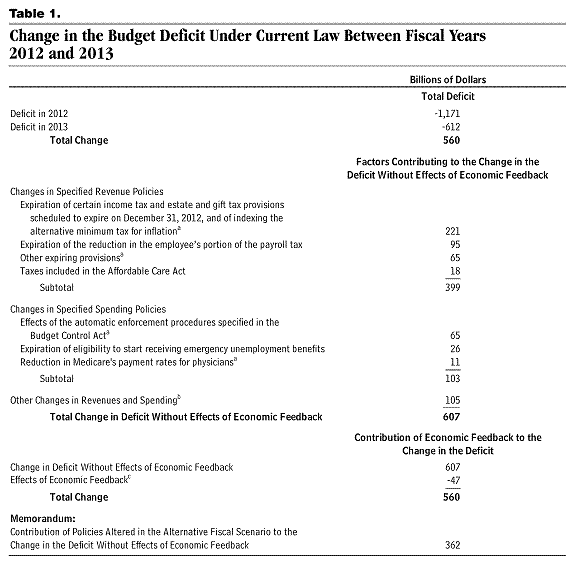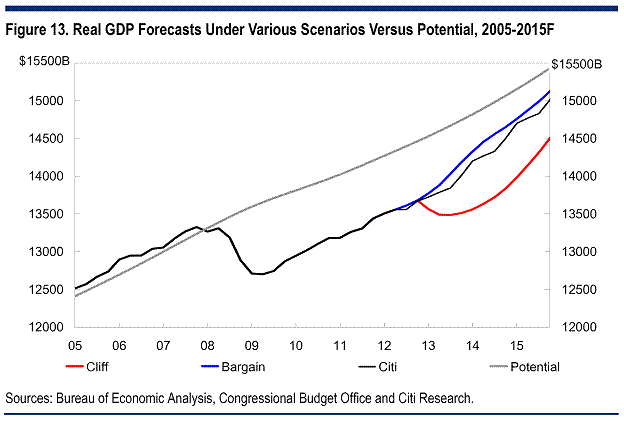Or, more accurately, non-New Classicals in the CRS
The Congressional Research Services (CRS), the Congress’ nonpartisan analytical arm, has released a report entitled “Sequestration: A Review of Estimates of Potential Job Losses”. From the summary:
One study estimated that a $48 billion sequester of Defense Department funds in 2013, compared with a baseline budget (without BCA cuts) for the calendar year, might support 907,000 fewer direct, indirect, and induced jobs. Job losses were forecast to diminish relative to the baseline after peaking in 2014 at about 1.2 million, with laid-off workers predicted to find new jobs in other industries as the economy adjusts to lower federal spending and employment recovers to the baseline forecast for 2022. Another analysis applied a 7.8% reduction to the National Institutes of Health budget for extramural awards, which are made to universities and other nongovernmental research facilities. It estimated that almost 34,000 direct, indirect, and induced job losses might result from such a program cut in FY2013. A third study, which reduced the budgets of Education Department and Head Start programs by 8.4%, put direct job loss among early childhood support personnel, elementary and secondary school educators, postsecondary faculty, and other support personnel at 80,500. Another analysis projected that a 2% reduction in Medicare’s budget ($10.7 billion) in 2013, compared with a baseline budget, might support 500,000 fewer direct, indirect, and induced jobs. Of that total, almost 212,000 are direct jobs in such occupations as nurses, housekeepers, independent contractors, and medical residents.
In one view of the world, this assessment is clearly wrong. Each defense worker who is fired from building a ship will be one more worker who can enter the pool of unemployed, to be employed immediately by a private firm making widgets. That is, as government spending is reduced, the resources thus released will be immediately re-employed. Some people might characterize this as a Classical model (or New Classical, when throwing in random technology and preference shocks). [1] [2]
Apparently, Governor Romney does not subscribe to this view. From Slate:
Romney has been talking up the military and the defense industry as an employment haven for weeks. On Aug. 14, he warned that looming defense cuts would “threaten 150,000 defense-related jobs” in Virginia. A week later, his new running mate, Paul Ryan, declared that the cuts “could put almost 44,000 jobs at stake right here in Pennsylvania. We’re not going to let that happen.” In North Carolina, Ryan said he and Romney opposed the cuts because “we don’t want to trade small-business jobs for military jobs. We want more jobs across the board.” And last week, Romney protested that under the cuts, “up to 1.5 million jobs could be lost. GDP growth could fall significantly.”
This argument is of course not consistent with a full-employment model, which is the typical alternative relied upon by those who have critiqued the use of multiplier analysis. I find it quite interesting how those who decried the use of models that allow for underemployment of resources are so willing to use the same type of models when assessing the implications of reduced defense spending.
Note, the sequester is only part of fiscal cliff:

Table 1 from CBO, “Economic Effects of Reducing the Fiscal Restraint That Is Scheduled to Occur in 2013,” May 2012.
It is of interest to see what financial sector economists are predicting in response to the fiscal cliff. Here is one forecast from Citibank:

Figure 13 from Citibank, “The Fiscal Cliff: Assessing the Policy Risks,” U.S. Macro Focus, 21 September 2012 [not online].
Note that the Citi estimates are for a more profound recession and long term impact because of assumed nonlinearities (a threshold “stall speed” when 4 quarter growth is below 1.5%) and spillover effects to the rest-of-the-world.
Update, 5:50PM Pacific: Louis Johnston provides more insight on Governor Romney’s military Keynesianism. See also Paul Krugman’s take.
Menzie wrote:
Each defense worker who is fired from building a ship will be one more worker who can enter the pool of unemployed, to be employed immediately by a private firm making widgets. That is, as government spending is reduced, the resources thus released will be immediately re-employed.
Does this strike anyone else as strange analysis? Unemployment has been above 8% since President Obama’s first month in office and even the most optimistic forecasts do not expect this to change much in the coming months. Yet somehow 907,000 unemployed defense workers are going to find new jobs?
Romney-Ryan understand that without a robust economy job losses due to the sequestration will only drive us deeper and deeper into economic woes.
This analysis in no way is complete for the full economic impact of the decisions that will create the fiscal cliff in January 2013. The only solution is economic growth and that does not come from throwing bits of colored paper out of a helicopter.
Ricardo is a Keynsian in favor of government spending to reduce unemployment? What…did they hand out a gazillion etch-a-sketches last night?
Menzie wrote:
“In one view of the world, this assessment is clearly wrong. Each defense worker who is fired from building a ship…”
“In one view of the world” being key to this point. I think we can all agree this world view is questionable in light of persistently high unemployment and relatively low capital utilization in many industries. If Widget manufacturers were going to turn on the widget machines and hire more workers, they would have already done it – a few more shipbuilders added to the unemployment pool doesn’t change the picture.
There’s no reason to expect these newly unemployed former-shipbuilders to be able to secure work easily when demand for labor is so low. You can’t make a “crowding-out” argument when we’re nowhere near full-employment.
randomworker,
Do know what a Keynesian is?
There is a huge difference between saying that unemployment created by Keynesian policies will prevent additional unemployed from becoming employed and throwing colored paper out of a helicopter expecting it to take root and magically produce goods and services.
So tell me, what about my comment is Keynesian?
Ricardo: Hmm. I think I you have Keynesians confused with somebody else. Keynes would argue for injections of spending by the government. Whether that spending would be monetized is a separate matter. And further, your allusion to helicopter money is different from swapping bonds for high powered money. (By the way, you might research who made the first allusion to helicopter money; that might prove instructive for you.)
So, let me stipulate you don’t know what a Keynesian is.
Menzie,
Okay, I will play. Milton Friedman was the first to mention dropping money from a helicopter. I thought everyone knew that. It is not a surprise. Friedman was actually a Keynesian with his monetarism simply a way to facilitate government control of spending. His brand of Keynesianism actually brought us to the point of massive QE (though both Keynes and Friedman would be appalled at what Krugman proposes and Bernanke has done).
Right before his death Keynes implied that he was not actually a Keynesian. Hayek told us that Keynes saw the excesses of his followers, but that he had such an exaggerated opinion of himself that he thought all he had to do was make a pronouncement and all his minions would fall in line. I guess he never got around to building mortality into his calculation.
Admittedly I have a little trouble following the logic of the highly skilled defense workers and subsequent downstream workers would have no trouble reentering the employed sector. But I will try to build on it.
State governments across the country are in a much more difficult financial situation. I suggest an equivalent sequester of state funds which provide the wage of University Professors. After all, these highly skilled and educated workers will have no problem reentering the employed sector. The immediate benefit to state budgets should be quite demonstrable.
Krugman’s labeling of this as “weaponized Keynesianism” is accurate.
I don’t know how the New-Classical economists are going to handle the rejection of their model by Ricardo, not to mention the CRS, Citi and even Mitt Romney. Yes, Ricardo, their analysis does seem “strange.”
My “rational expectations” are that N-Cl will have plenty of believers when policy preferences dictate.
Mitt Romney and Paul Ryan are also displaying their ignorance of the DoD’s planning, budgeting and execution process. Many of the big defense contractors are funded through Procurement Appropriation accounts, which have a three year budget execution life and another five year disbursement life. In plain English, this means that monies that were appropriated in FY2011 and FY2012 but not yet obligated (i.e., not yet on contract) are still available for award through FY2013. Once awarded, disbursements from Treasury will be authorized through FY2018 for FY2011 appropriations and through FY2019 for FY2012 appropriations. The sequestration primarily affects projects funded through Research, Development, Technology and Engineering (RDT&E) appropriations (i.e., primarily government engineers and scientists) and Operations & Maintenance (O&M) accounts. Those appropriations only have a one year budget execution life and a five year disbursement life. Some of the overpaid Beltway Bandit consultants might be affected by the sequestration, but not the typical Joe Sixpack working in defense plants.
I don’t expect the average voter to understand the byzantine budget rules in G-8 land of the E-Ring, but I don’t think it’s too much to ask of a Presidential candidate and of someone who has served in Congress most of his adult life.
I assume that Menzie’s “one view of the world” refers to neo-classical economists. I would be surprised to hear a neo-classical economists say that the economy would “immediately” re-employ laid off workers. If the neo-classical school is familiar with even the basics of real shocks, then they would say that it will take time to adjust. Wouldn’t they?
I will say that neo-classical economists tend to ignore time as a factor compared to what I would prefer. Austrians would certainly not say that the economy will immediately adjust. It takes time for the market process to work, for entrepreneurs to discover opportunities and adjust to them. And you can have permanent imbalances due to other government interventions. So they would agree that the government and defense contractors suddenly laying off hundreds of thousands of people will push the economy into recession while entrpreneurs change their combination of factors of production to account for new prices and generate a new pattern of sustainable specialization and trade.
Max